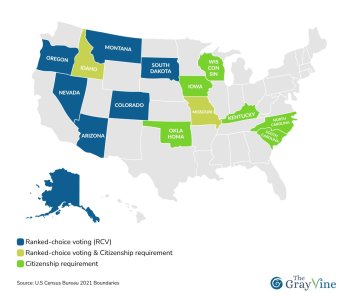Must-See Map: Is Your State Changing How You Vote? Find Out Now!
By
Aubrey Razon
- Replies 0
With November ballots approaching, the stakes are higher than just choosing leaders; they have the potential to reshape our democracy. Dear readers of The GrayVine, as we prepare for another election, it’s important to focus not only on the candidates but also on the rules that govern how we vote.
Across the United States, a mix of proposals could significantly impact the voting landscape for years to come. Fifteen states are set to decide on ballot measures that could revolutionize or limit how we cast our votes in future elections. This isn’t just a minor detail; it’s a crucial development that could transform the narrative of American democracy.
From the sun-baked deserts of Arizona to the rugged mountains of Montana, from the rolling plains of South Dakota to the lush forests of Oregon, voters will step into booths not just to pick a president but to pick a path.
This system lets voters rank candidates by preference. If no one hits the 50 percent mark, the least popular candidate is dropped, and votes are redistributed based on second choices, and so on, until someone crosses that majority threshold.
This isn't a wild, untested idea.
Maine has been using RCV, and cities across the nation have adopted it for local elections. It's a system that encourages more nuanced voting and can lead to broader representation.
But it's not without controversy. Alaska is considering repealing RCV, and Missouri is pondering a ban before it even starts.
It's a system that California and Washington have embraced, known colloquially as “jungle primaries.”
It's a shake-up that could see Democrats, Republicans, and independents all jostling in the same race, changing the strategic calculus for campaigns.
Meanwhile, a different kind of change is on the ballot in Idaho, Iowa, Kentucky, Missouri, North Carolina, Oklahoma, South Carolina, and Wisconsin.
These states are considering measures to prevent noncitizens from voting in local elections—a practice currently legal in select municipalities.
While federal law bars noncitizens from voting in national elections, this move would tighten the rules at the local level, where some areas have opened the ballot box to those without citizenship.
As we age, we understand more than ever the importance of legacy—what we leave behind matters. The way we vote and the systems we put in place—they're part of that legacy. They're the tools we hand to our children and grandchildren, the mechanisms by which they'll shape their world.
So, as you sip your morning coffee and ponder the changing leaves, take a moment to consider the changing rules of our electoral system. Review your state's proposals, educate yourself on the implications, and make your voice heard.

Have you experienced ranked-choice voting or nonpartisan primaries? What are your thoughts on these systems? And how do you feel about the citizenship requirements for voting? Share your insights and experiences in the comments below.
Across the United States, a mix of proposals could significantly impact the voting landscape for years to come. Fifteen states are set to decide on ballot measures that could revolutionize or limit how we cast our votes in future elections. This isn’t just a minor detail; it’s a crucial development that could transform the narrative of American democracy.
The Map of Change
Imagine a map, not of highways and byways, but of possibilities and what-ifs. This map shows states marked by the potential for change, where the rules of voting are up for debate.From the sun-baked deserts of Arizona to the rugged mountains of Montana, from the rolling plains of South Dakota to the lush forests of Oregon, voters will step into booths not just to pick a president but to pick a path.
Ranked-Choice Voting: A New Direction?
Ranked-choice voting (RCV) is on the ballot in Arizona, Colorado, Idaho, Montana, Nevada, Oregon, and South Dakota.This system lets voters rank candidates by preference. If no one hits the 50 percent mark, the least popular candidate is dropped, and votes are redistributed based on second choices, and so on, until someone crosses that majority threshold.
This isn't a wild, untested idea.
Maine has been using RCV, and cities across the nation have adopted it for local elections. It's a system that encourages more nuanced voting and can lead to broader representation.
But it's not without controversy. Alaska is considering repealing RCV, and Missouri is pondering a ban before it even starts.
Nonpartisan Primaries: The Jungle Out There
Some states are flirting with the idea of nonpartisan primaries, where all candidates compete in a single primary regardless of party, with the top finishers moving on to the general election.It's a system that California and Washington have embraced, known colloquially as “jungle primaries.”
It's a shake-up that could see Democrats, Republicans, and independents all jostling in the same race, changing the strategic calculus for campaigns.
Citizenship and the Vote: A Question of Inclusion
Meanwhile, a different kind of change is on the ballot in Idaho, Iowa, Kentucky, Missouri, North Carolina, Oklahoma, South Carolina, and Wisconsin.
These states are considering measures to prevent noncitizens from voting in local elections—a practice currently legal in select municipalities.
While federal law bars noncitizens from voting in national elections, this move would tighten the rules at the local level, where some areas have opened the ballot box to those without citizenship.
As we age, we understand more than ever the importance of legacy—what we leave behind matters. The way we vote and the systems we put in place—they're part of that legacy. They're the tools we hand to our children and grandchildren, the mechanisms by which they'll shape their world.
So, as you sip your morning coffee and ponder the changing leaves, take a moment to consider the changing rules of our electoral system. Review your state's proposals, educate yourself on the implications, and make your voice heard.
Key Takeaways
- Voters in 15 states are deciding on ballot measures that could change voting rules for future elections, on topics including ranked-choice voting and noncitizen voting in local elections.
- Several states are considering adopting ranked-choice voting, while others are debating on prohibiting noncitizens from voting in local elections.
- Ranked-choice voting allows voters to rank candidates in order of preference, potentially leading to a more accurate representation of voter choice.
- States are also considering shifts to nonpartisan primary systems, similar to those used in California and Washington, and some states, like Idaho and Missouri, are voting on measures that would prohibit local governments from allowing noncitizens to vote in elections.
Last edited:







